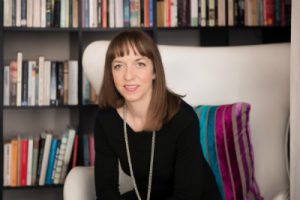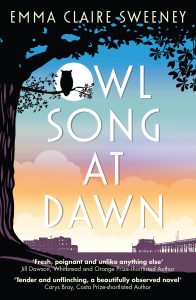Speaking Up for Those Who Can’t Answer Back
 Some of my most prominent memories of grammar school days relate to my sister, Lou, even though she attended the special school across the other side of town. After a swimming lesson in the early nineties, for example, an older boy referred to Lou as a ‘spaz’. I still remember the sudden strength I acquired when I pinned him against the wall, seeing it as my role to speak up on her behalf.
Some of my most prominent memories of grammar school days relate to my sister, Lou, even though she attended the special school across the other side of town. After a swimming lesson in the early nineties, for example, an older boy referred to Lou as a ‘spaz’. I still remember the sudden strength I acquired when I pinned him against the wall, seeing it as my role to speak up on her behalf.
It was this same motivation that buoyed me up with an inflated sense of creative optimism when, decades later, I embarked on the first draft of Owl Song at Dawn. In fiction, I felt I could reduce the distance between the articulate and the apparently inarticulate.
A character with profound learning disabilities could narrate in the first-person, claiming the ‘I’ as her own. I could give the reader direct access to the mind of such a character – a narrative strategy that has an ethical dimension because it encourages a sadly rare opportunity to identify and empathise.
 The more I wrote, the more apparent it became that I was confronting a thorny paradox: those whose stories most need to be heard might be least able to tell them. At each turn, I found myself wrestling with the practical, artistic, and moral challenges of giving voice to those who might find it difficult to answer back.
The more I wrote, the more apparent it became that I was confronting a thorny paradox: those whose stories most need to be heard might be least able to tell them. At each turn, I found myself wrestling with the practical, artistic, and moral challenges of giving voice to those who might find it difficult to answer back.
As a schoolgirl, I had failed to comprehend this moral minefield. Back in the early nineties, of course, ‘Nothing About Us Without Us’ had not yet become the slogan of the disability rights movement.
The publication of Know Me As I Am: An Anthology of Prose, Poetry and Art by People with Learning Difficulties marked a ground-breaking moment. Its editors, Dorothy Atkinson and Fiona Williams, were staggered both by the volume of submissions as well as by the richness and diversity of their content, claiming that these stories upturned the frequent assumption ‘not simply that the opinions of people with learning disabilities did not matter, but that they did not exist’.
Since the publication of Know Me As I Am, life history and inclusive research have flourished in the field of disability studies, but have not made it into the mainstream. Experts in this field admit that the inclusion of people with profound and complex learning disabilities in their own accurate and sensitive representation remains the holy grail of participatory research. And so the territory is left tantalisingly unmapped for the novelist.
Even within the parameters of the novel form, with its inbuilt acknowledgement of mind-reading, I continued to wrestle with the moral implications of speaking up on behalf of those who might struggle to contest my version.
My early attempts to give voice to a fictional character with learning disabilities in my novel-in-progress, Owl Song at Dawn, had resulted in the kind of patronising, infantile qualities that I was trying to undermine. Could this not disempower the very people I was trying to help?
When I was awarded a yearlong Arts Council residency at Sunnyside Rural Trust to work with a group of adults with learning disabilities to compile an anthology of life stories, I found a solution to the problem in my novel.
 It was only when I listened to the recordings I had made at Sunnyside that I realised I was listening to a new kind of lyricism, but one I found half-familiar because it shared some of the qualities of my sister’s tongue: a language I have spent a lifetime trying to learn. I realised that I could write vignettes using only the words and experiences of the participants, that through repetition and placement even a narrow range of phrases could take on diverse meaning, and, that by listening with the heart, readers might feel as if they have understood something that has been expressed through fracture and lacunae as well as through coherence.
It was only when I listened to the recordings I had made at Sunnyside that I realised I was listening to a new kind of lyricism, but one I found half-familiar because it shared some of the qualities of my sister’s tongue: a language I have spent a lifetime trying to learn. I realised that I could write vignettes using only the words and experiences of the participants, that through repetition and placement even a narrow range of phrases could take on diverse meaning, and, that by listening with the heart, readers might feel as if they have understood something that has been expressed through fracture and lacunae as well as through coherence.
I began transcribing all the things my sister said to me during our nightly phone-calls:
Cheeky pie and custard don’t forget the mustard. What’s your name? My name’s Louise Katherine Sweeney, 31 Grange Road East, Claughton, Merseyside. Where’s Sarah? Sarah’s in Leeds. Where’s Seth? My nephew. Seth’s laughing at me! You’re drunk! That’s not funny. What noise does a cow make? Moooo. Who do you love the best, Mum or Dad? You’re stupid. You stink! I like tractors. I like owls. Twit-twoo, I love you true.
In the revised versions of my novel, I have attempted to capture something of Lou’s language in the voice of Edie, my character with learning disabilities. Of course, I have simultaneously adapted it for the character who was born in the 1930s in Morecambe and whose seminal life experiences are radically different from Lou’s.
This redrafting trajectory took me closer to an appreciation of the kinds of stories that Lou is already expressing with her melodic and quirky turns of phrase. Together, Lou and the Sunnyside poets taught me to avoid speaking up on behalf of people with learning disabilities, and instead to attempt to narrate with them.
—
Emma Claire Sweeney has won Arts Council, Royal Literary Fund and Escalator Awards, and has been shortlisted for several others, including the Asham, Wasafiri and Fish. She publishes features and pieces on disability for the likes of the Guardian, the Independent on Sunday and The Times; teaches creative writing at New York University in London; and co-runs SomethingRhymed.com – a website on female literary friendship.
Owl Song at Dawn, a novel inspired by her sister who has autism and cerebral palsy, will be published by Legend Press in 2016.
A Secret Sisterhood: The Hidden Literary Friendships of Jane Austen, Charlotte Bronte, George Eliot and Virginia Woolf, which she is co-writing with her own friend, Emily Midorikawa, will come out in 2017 with Aurum Press in the UK and Houghton Mifflin Harcourt in the USA.
Category: Contemporary Women Writers, On Writing























